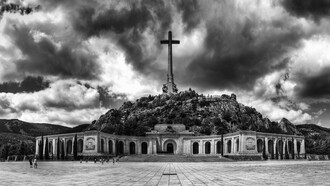I left Dusan in Belgrade airport to arrive on the Montenegrin coast one Sunday evening in summer. In Soviet times the nomenclature would go straight to Tivat from Moscow to relax by the sea and bypass Belgrade. In Montenegro, I participated in a health management summer school, which took place over a casino; in my case, through a process of tiring sequential translation from English to Serbian. It went something like this, Me: one, two, three, up to 5 minutes; Interpreter, then me, again Interpreter, me, then Interpreter... After a couple of hours of me with my alternate-erudite Interpreter next to me, I would get ahead of myself and have to be hauled back, sometimes utterly confused. With great resilience the post graduate participants stuck it out. The most fruitful sessions I am sure took place on a splendid terrace overlooking the archipelago.
Scientifically, the ECPD summer school was directed by the Professor (Geordi) who was present at Alma Ata when still unrecognized primary health care came onto the agenda of the WHO. He would regale us with medical stories that included Tito. On one occasion it covered an imperial guest, a dictator who would not leave his much younger and beautiful wife alone for her medical examination with the young doctor.
The delightful and ageing administrative director (Milovan), a former ambassador to Japan made sure that I saw the countryside, follow in the path of wartime resistance from its starting point and hear about strange and progressive events that had taken place up and down the Adriatic coast. He was enthusiastic as he talked to me about the Austrian-Serbian campaign and the sequential battles at the beginning of WWI. It came in three waves first in Montenegro and finally in Belgrade. Instead of facing greatly superior numbers the tired Montenegrin army retired from the third battle. Milo used to say do not expect salvation in retreat.
This Adriatic coast became a place of refuge for the humiliated Colchidians having failed to take back the Golden Fleece. Had it been a contemporary event the posse from Colchis would have been trapped in the Balkan corridor of immigrants. Thirty-eight years after Johannes Gutenberg invented the printing press (1494), the first state-owned model was established in Cetinje. In that year the Ostoih Book of Psalms was printed, believed to be the first book in Cyrillic from the South Slavic region. Petar Petrović Njegoš well known internationally, is celebrated widely and without question a great poet. Milo ensured that I visit his birth place and the ancient and diplomatic capital of Montenegro, Cetinje. In its museum, I was always fond of a painting of a traditional musical instrument, the Gusla.
In 1919, a strange incident took place in Fiume, now Rijeka, which four years earlier successfully put down a typhus epidemic. In the same typhus epidemic 100,000 Serb soldiers and some 60,000 Austria-Hungarian POWs died. The incident revolved around a flamboyant fighter pilot, an Italian poet Gabriele D’Annunzio who gathered a small army, stormed the town, and held it hostage. His balcony speeches became fodder for Hitler and Mussolini and his stiff arm salute was adopted by fascism. For more than a year his megalomania and sexual indulgences ruled Fiume as the big powers simply looked on. As a result of Italian naval bombardment, the fiefdom came to an end. The pompous poet retreated.
Because our educational programme was on health we had to visit the Church of Our Lady of Health where remedies were available. Milo had an eye problem and for him the visit was a must. It stands half way up the difficult incline above the old Mediterranean port of Kotor surrounded by fortifications built during the Venetian period.
Milo told me that Montenegro is somewhat special; when a tired god finished putting the world together he looked down, saw a few stones and picked them up. He then flung them as far as he could, saying I call this Montenegro! He would tell me about the brigands of Montenegro and the madness of heroism reciting a poem how else will that which cannot be, nevertheless become? The codes of the clans kept them from taking actions against comrades and clansmen. A later slogan said that a communist would never fire on a communist. It was in relation to the tension between Stalin and Tito. And then there was the story of a forgotten English lass and lover of a Serbian philosopher. After leaving him she joined the resistance she was killed in Montenegro in 1943. As a foreigner she was regarded with suspicion. When UNRRA aid reached Montenegro, one consignment contained pickaxes and shovels. It was immediately returned with an attached note, these must be for some other fraternal republic, not for us.
Christmas in Montenegro in 1942 and 1943 was celebrated with recitations and inspirational readings from the Mountain Wreath; the communists directed their recitations against aggressors and traitors, the Chetniks towards the massacre of the renegades. Almost two decades ago Nato aircraft targeted Montenegro, an act, which remains a painful memory for many Montenegrins.. Ana Misurovitc, director of a Toxicological Institute tried to enlist the help of the international community with respect to decontamination and clean up of depleted uranium. Her message to NATO: Come and take back your radioactive waste - depleted uranium- and pay for decontamination.
My first intervention in ECPD post graduate educational activities was to introduce group problem solving and draw upon materials from world shattering events to stimulate the participants. There would always be lead in and take away questions as well as a dilemma for consideration.
Questions pertinent for all societies were asked this past year in Becici, with examples such as what is the probability of a patient being diagnosed correctly in comparison to fifteen years ago and what is the level of certainty that the elderly suffering chronic disease will continue to receive needed medications without interruption?
International immigration sums up to catastrophe. One disaster is the Balkan corridor, a pathway into Europe that should not exist, but does. It is a quasi-legal pathway that should not exist on the basis of Schengen and Dublin agreements. It is an unfortunate reminder of the powder keg metaphor for the Balkans. The corridor has its own port, the Mediterranean sea and a migration pathway for those with determination to reach for a better life in Europe. Bottlenecks exist, borders are closed and there is a crisis of protection and of safe passage. Passage occurs in a background of violence and trauma much of it initiated by state authorities, with women and children suffering most. People and governments have their back up towards refugees and asylum seekers.
The Balkan corridor and ongoing situation provided a lead in to new questions each one belying a dilemma! The Questions?
A medical question? What happens when alien cells try to fuse with the cells in an experimental culture? What should we do? Destroy the alien cells if we can? Allow fusion and endanger the experimental culture and the experiment? The poet will always take the road least travelled by. The scientist?
A theatrical question?: 2500 years ago, Aeschylus (suppliant women Ικετιδες) asked how far we should go to protect the stranger –the foreigner- ξένος.
A European union question: what comes first our values and rules of hospitality or our investment in a European cloistered world , or fortress Europe?
The French: 19th Century sociologist (Emile Durkeim) provided an analysis of the stranger and other dilemmas in the community and Camus gave us the Stranger and the Plague; commentaries on human existence, absurd, irrational, purposeless; Christianity conceived of as rational and universal, imbuing life with metaphysical meaning; the plague, a collective disaster threatening the social order, now immigration. The Montenegrin, Petar Njegosh: In the Mountain Wreath (Gorski Viennes), which he wanted to call the Unveiled Spark (Isri Iskra) and which he should have done, but didn’t. It was too close to the powder keg and powerful metaphor tinderbox, representative descriptions of the Balkans. He provided a dichotomy and a dilemma, which are taught today in local Montenegrin schools, namely, rooting out the converts of Islam, versus the wider role of Montenegro on the world stage. Njegosh came down on the side of internationalism so did Santorio of Padua and Andrija Stampar from Croatia, so does the ECPD. The poet, bishop, diplomat Njegosh remains eminently current.
Our dichotomy: Prevention versus therapy or a more rational consideration and application of both under the banner of public health. But it is politics that puts on the brake. It has been said, to find anyone in government, in the medical world or anywhere else oriented to prevention is like searching for a needle in a hatstack. It is an extinct species along with failing public health leadership.
Health politics expressed in the US Congress: The secretary of health predicted that the administrative plan was to promote prevention by spending as little as possible. It followed on from D.A. Henderson’s proposal to develop a network of health promoting and disease preventing institutions. Senator Hatch had called 3 expert witnesses to Capital Hill, the Secretary, Henderson and Denton Cooley. As the latter entered, there was a senatorial stampede to touch his coat with Hatch out in front. It was noted that Henderson, a man who had saved millions through his smallpox eradication work sat quietly going over his notes while an embarrassing fuss was made over the good doctor who may have saved 1000 lives. The countries senatorial finest fawned over the great heart surgeon, Dr. Cooley. “Preventionists” always have a hard time in the arena of medicine. Even Obamacare opponents come in second.
In the final act, Shakespeare leaves Othello and Desdemona to treat each other as respectful strangers, as they take their different emotional paths. The bible and all holy books advocate that a stranger residing with us should be treated as native. Our behaviour towards foreigners and migrants is a crucial indicator of where we stand as enlightened human beings.
At the end of the day sometimes with Geordy, sometimes with Milo and always with a number of participants we would eat leisurely on a terrace over the archipelago and imbibe Montenegrin wines. To overcome the stress of our dilemmas and from sequential translation I would get ahead again with a glass of "rakija".
References:
Jovana Arsenijević, et al. A crisis of protection and safe passage: violence experienced by migrants/refugees traveling along the Western Balkan corridor to Northern Europe. Conflict and Health 201711:6.
UNHCR. Hungary: UNHCR concerned about new restrictive law, increased reports of violence, and a deterioration of the situation at the border of Serbia. Accessed 9 Sept 2016.
W. H. Crawfurd Price (1918). Serbia's Part in the War. Simpkin, Marshall, Hamilton, Kent & Company. (PD-icon.svg Public domain).
Michael K. Gemmell. A History of ASPH 1941-2001, Association of Schools of Public Health, Washington, 2004.
Marlise Simons. Kotor Journal; On a Balkan War's Last Day, Trouble From the Sky, Sept. 2002.
Thomas M. Poulsen et al. Montenegro.














